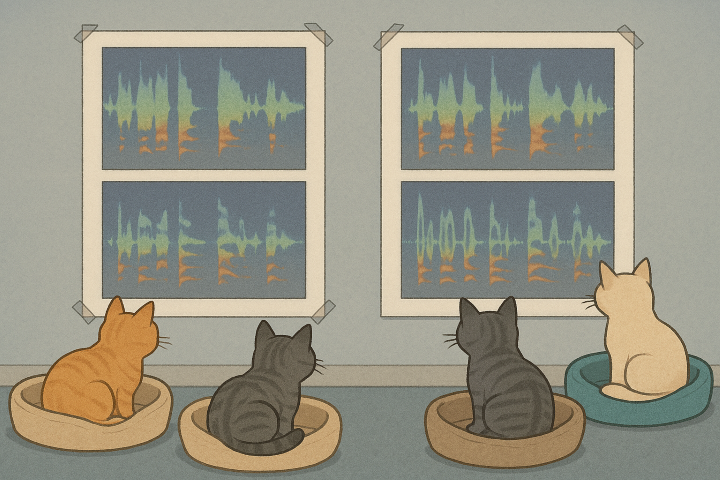About
The Cornell Phonetics Lab is a group of students and faculty who are curious about speech. We study patterns in speech — in both movement and sound. We do a variety research — experiments, fieldwork, and corpus studies. We test theories and build models of the mechanisms that create patterns. Learn more about our Research. See below for information on our events and our facilities.

Upcoming Events

15th October 2025 12:20 PM
Phonetics Lab Meeting
Topic TBD
Location: B11 Morrill Hall, 159 Central Avenue, Morrill Hall, Ithaca, NY 14853-4701, USA
17th October 2025 01:30 PM
CNY Humanities Corridor - two-day Phonology Workshop at Cornell University
The LIN10 Sound Structures Working Group, funded through the CNY Humanities Corridor, is holding a 1.5-day workshop on October 17-18 at Cornell University. We encourage all interested students and faculty to attend. Details of the workshop are given below; some of the events will be of general interest to students/faculty who are not working strictly in phonetics/phonology!
Friday (October 17): Using corpora to answer phonological questions
On Friday, Meredith Tamminga (UPenn) will lead a workshop on using corpus methods to address phonological questions. The workshop will be focused on broader issues in using corpora, such as: what types of questions can we address using corpora? What type of speaker metadata do we need? The Friday workshop will take place from around 1:30-5pm. Pre-workshop lunch and post-workshop dinner will be provided.
Saturday (October 18): Do different facets of phonology row together?
Saturday will be a full-day thematic workshop, with talks taking place from around 10:30-5pm (all meals provided). We invite submissions of abstracts for the Saturday workshop, detailed below.
A widely held assumption in generative phonology is that the different facets of phonology row together, that is, behave in a homogeneous way, such that evidence from the nature of contrast, phonotactics, morphophonology and allophony should all align. However, these domains often also behave in distinct ways, differing in whether they have a clear phonetic motivation, and also in their regularity, productivity, scope, and gradience. This suggests that uniformity of patterning is only a subset of the possible outcomes. In this workshop, we aim to address issues concerning the relationship between facets of phonology. In what ways do the different facets of phonology differ and how can we study these differences? Do different facets of phonology have different learning mechanisms?
Abstract submissions should be no longer than one page (no strict formatting requirements), and should broadly touch on this theme, addressing topics such as:
·The relationship between allophonic and morphophonemic alternations
·The relationship between phonotactics and alternations
·The nature of contrast and how this relates to other domains of phonology
·How domains of phonology may differ in their phonetic motivation, productivity, gradience, scope, etc.
Registration: Required but free of charge, and open to any interested scholars or students in Upstate NY. All meals will be provided. A registration link will be provided once the program has been set.
Location: Morrill Hall, 159 Central Avenue, Morrill Hall, Ithaca, NY 14853-4701, USA
20th October 2025 12:20 PM
PhonDAWG - Phonetics Lab Data Analysis Working Group
Topic TBD
Location: B11 Morrill Hall, 159 Central Avenue, Morrill Hall, Ithaca, NY 14853-4701, USA
27th October 2025 12:20 PM
PhonDAWG - Phonetics Lab Data Analysis Working Group
Topic TBD
Location: : B11 Morrill Hall, 159 Central Avenue, Morrill Hall, Ithaca, NY 14853-4701, USA
Facilities
The Cornell Phonetics Laboratory (CPL) provides an integrated environment for the experimental study of speech and language, including its production, perception, and acquisition.
Located in Morrill Hall, the laboratory consists of six adjacent rooms and covers about 1,600 square feet. Its facilities include a variety of hardware and software for analyzing and editing speech, for running experiments, for synthesizing speech, and for developing and testing phonetic, phonological, and psycholinguistic models.
Web-Based Phonetics and Phonology Experiments with LabVanced
The Phonetics Lab licenses the LabVanced software for designing and conducting web-based experiments.
Labvanced has particular value for phonetics and phonology experiments because of its:
- *Flexible audio/video recording capabilities and online eye-tracking.
- *Presentation of any kind of stimuli, including audio and video
- *Highly accurate response time measurement
- *Researchers can interactively build experiments with LabVanced's graphical task builder, without having to write any code.
Students and Faculty are currently using LabVanced to design web experiments involving eye-tracking, audio recording, and perception studies.
Subjects are recruited via several online systems:
- * Prolific and Amazon Mechanical Turk - subjects for web-based experiments.
- * Sona Systems - Cornell subjects for for LabVanced experiments conducted in the Phonetics Lab's Sound Booth

Computing Resources
The Phonetics Lab maintains two Linux servers that are located in the Rhodes Hall server farm:
- Lingual - This Ubuntu Linux web server hosts the Phonetics Lab Drupal websites, along with a number of event and faculty/grad student HTML/CSS websites.
- Uvular - This Ubuntu Linux dual-processor, 24-core, two GPU server is the computational workhorse for the Phonetics lab, and is primarily used for deep-learning projects.
In addition to the Phonetics Lab servers, students can request access to additional computing resources of the Computational Linguistics lab:
- *Badjak - a Linux GPU-based compute server with eight NVIDIA GeForce RTX 2080Ti GPUs
- *Compute server #2 - a Linux GPU-based compute server with eight NVIDIA A5000 GPUs
- *Oelek - a Linux NFS storage server that supports Badjak.
These servers, in turn, are nodes in the G2 Computing Cluster, which currently consists of 195 servers (82 CPU-only servers and 113 GPU servers) consisting of ~7400 CPU cores and 698 GPUs.
The G2 Cluster uses the SLURM Workload Manager for submitting batch jobs that can run on any available server or GPU on any cluster node.
Articulate Instruments - Micro Speech Research Ultrasound System
We use this Articulate Instruments Micro Speech Research Ultrasound System to investigate how fine-grained variation in speech articulation connects to phonological structure.
The ultrasound system is portable and non-invasive, making it ideal for collecting articulatory data in the field.

BIOPAC MP-160 System
The Sound Booth Laboratory has a BIOPAC MP-160 system for physiological data collection. This system supports two BIOPAC Respiratory Effort Transducers and their associated interface modules.

Language Corpora
- The Cornell Linguistics Department has more than 915 language corpora from the Linguistic Data Consortium (LDC), consisting of high-quality text, audio, and video corpora in more than 60 languages. In addition, we receive three to four new language corpora per month under an LDC license maintained by the Cornell Library.
- This Linguistic Department web page lists all our holdings, as well as our licensed non-LDC corpora.
- These and other corpora are available to Cornell students, staff, faculty, post-docs, and visiting scholars for research in the broad area of "natural language processing", which of course includes all ongoing Phonetics Lab research activities.
- This Confluence wiki page - only available to Cornell faculty & students - outlines the corpora access procedures for faculty supervised research.

Speech Aerodynamics
Studies of the aerodynamics of speech production are conducted with our Glottal Enterprises oral and nasal airflow and pressure transducers.

Electroglottography
We use a Glottal Enterprises EG-2 electroglottograph for noninvasive measurement of vocal fold vibration.

Real-time vocal tract MRI
Our lab is part of the Cornell Speech Imaging Group (SIG), a cross-disciplinary team of researchers using real-time magnetic resonance imaging to study the dynamics of speech articulation.

Articulatory movement tracking
We use the Northern Digital Inc. Wave motion-capture system to study speech articulatory patterns and motor control.
Sound Booth
Our isolated sound recording booth serves a range of purposes--from basic recording to perceptual, psycholinguistic, and ultrasonic experimentation.
We also have the necessary software and audio interfaces to perform low latency real-time auditory feedback experiments via MATLAB and Audapter.

